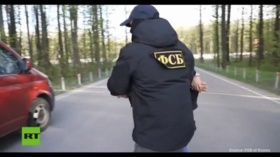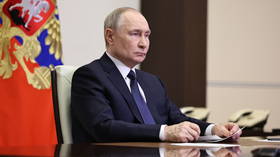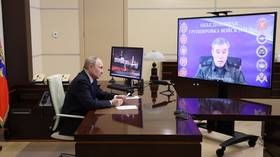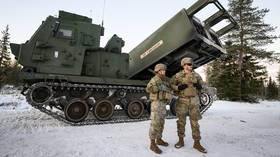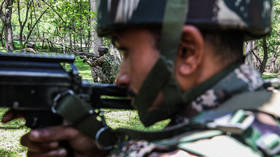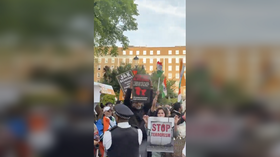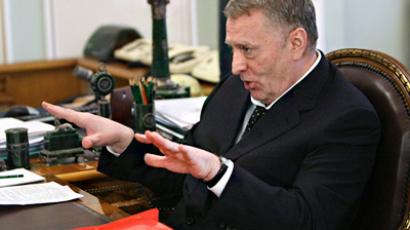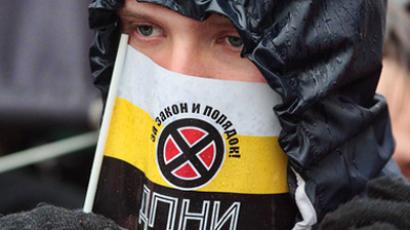Liberal-Democrats gather for a pow-wow with nationalists
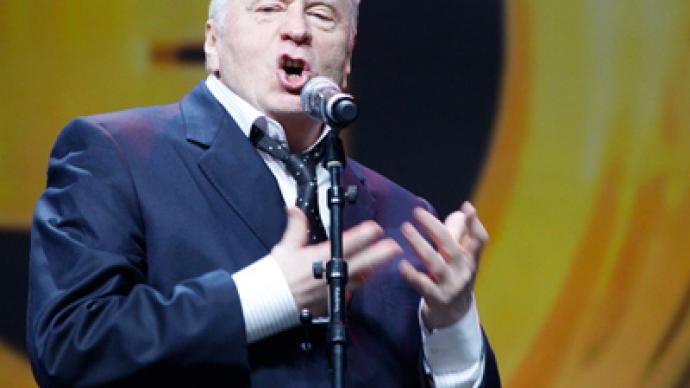
As pre-election fever is heating up, the liberal-democrats are turning up the nationalist rhetoric. The LDPR head held a meeting of the Russian Committee, whereby members of banned nationalist movements took part.
The Moskovskiye Novosti (MN) newspaper reported that Vladimir Zhirinovsky – the head of the Liberal-Democratic Party (LDPR) as well as the deputy parliament speaker – hosted a session of the Russian Committee. The new body was set up on June 21 with the aim of protecting the rights of Russian nationals and promoting relevant legislation in the State Duma. Representatives from several banned nationalist organizations, including the Slavic Union and the Movement against Illegal Immigration (DPNI) were invited to participate in the new movement. The daily did not clarify whether the Russian nationalist leaders – such as Aleksandr Belov, a founder of DPNI or Dmitry Demushkin, a former leader of the Slavic Union – were taking part in the Mondays’ meeting. The committee recalled events in December of last year when football supporters and nationalists clashed with police on Manezhnaya Square near the Kremlin following the death of a football fan who had been killed in a fight with natives of the North Caucasus. The participants also discussed several legislative initiatives, including a bill that would give Russian citizens a right to bear small arms. Despite that, LDPR members and nationalists believe that everyone who considers oneself to be a Russian should be able to denote their nationality in their passport. Yet another idea voiced at the committee’s session was the introduction of amendments to the law on “Maternity Capital”. Under the program, every Russian woman who gives birth to a second, third, fourth, etc. child is entitled to receive a fixed sum of money. Currently, it amounts to over 360,000 roubles (about $US 13,000). The main point of the project, which was launched several years ago, was to boost the birth rate in the country. A member of the LDPR faction, Sergey Ivanov, told MN that the Russian Committee had suggested paying money not only to women, but to their husbands as well, thus turning “maternity capital” into “family capital”. However, the politicians believe that only regions with low birth rates should be supported. “There is no point in subsidizing the North Caucasian republics,” he noted. The legislator was apparently referring to the common practice of families having at least two children in that part of the Russian Federation.The main leitmotif of the gathering was a demand to stop “cultural aggression against Russians”. In his blog featured on the website of Echo Moskvy radio station, Zhirinovsky wrote that “the Russian issue lately has become specifically acute.”The preservation of Russian national culture as well as “the widening of the sphere of use of the Russian language” are among the key tasks, he stressed. According to the LDPR leader, what happens in a number of the country’s regions and abroad is nothing but “language terrorism”: Russians are eitherforced to learn the languages of those ethnic groups who make up a majority in other regions or are even banned from speaking Russian.Zhirinovsky pointed out that by establishing the Russian Committee, his party has given public organizations a venue for discussing the so-called “Russian issue”. He stressed that the LDPR does not impose their views on others, but only helps with organizational issues and offers help in translating the ideas into legislative initiatives.Meanwhile, experts say that a union between liberal-democrats and nationalists would be mutually beneficial.According to Aleksey Makarkin, an analyst and deputy director at the Center for Political Technologies in Moscow, Zhirinovsky looks at the situation quite pragmatically and knows that his party could gain from raising the national issue prior to the State Duma elections in December of this year. “It is more than likely that the Russian Committee will be forgotten after the vote,” he told MN. For nationalist leaders like Belov and Demushkin, cooperation with Zhirinovsky is a chance to get back on the political scene. The analyst recalled that not long ago, the two visited Chechnya and met with Ramzan Kadyrov, the head of the republic. The point of the move was to demonstrate to the authorities that they are now manageable since they no longer call for ethnic nationalism, a position which was wholly unacceptable to the Kremlin.



